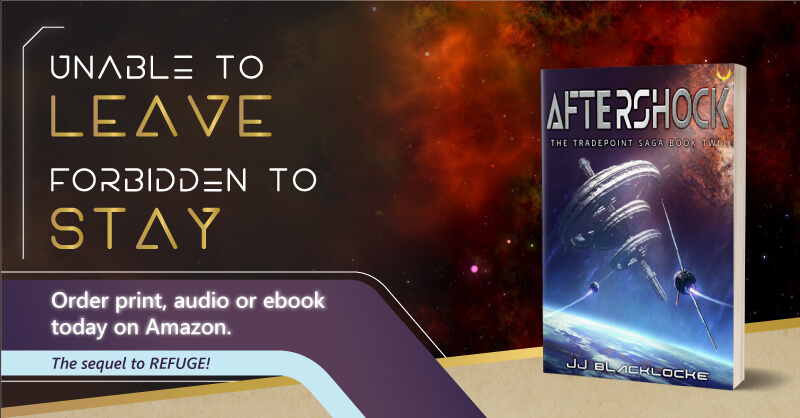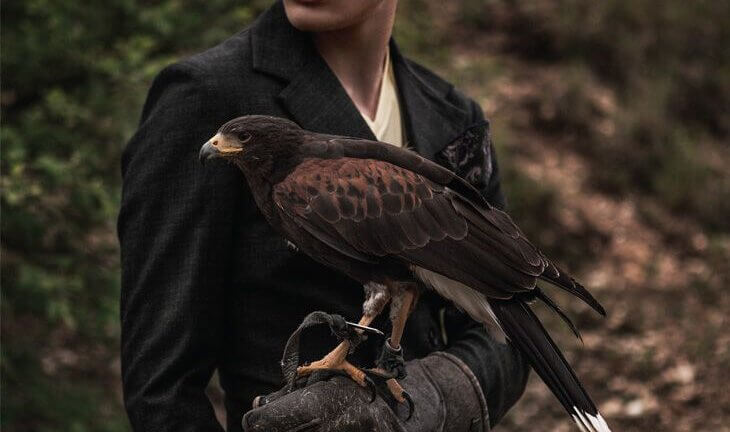
Bookwyrm’s Guide to the Galaxy, a wonderful blog, has just posted its review of AFTERSHOCK, saying, “The offbeat sequel to Refuge, Aftershock introduces the reader to the struggles and conflict that comes with loss of culture, and the desperate attempt to reclaim it.”
Review: “JJ Blacklocke’s Aftershock is aptly named after the final events of the first book in this trilogy. What happens when everything you’ve ever known is abruptly taken from you? How do you balance the inevitable resolution of leadership with empathy and understanding? How do you decide what must be done in unprecedented times?
Aftershock explores answers to these questions and more, in a story made fascinating by its focus on the cultural and social aspects of maintaining tradition while rebuilding society.
Now that the Vennans are stranded on Tradepoint, they will have to adjust to increasingly new realities, change the context of their very cultural traditions, and adapt to the loss of everything they have ever known.
With a population of slightly over nine hundred, and stuck on a merchant space station where their native resources are slowly dwindling, they must venture the void to find a new home and rebuild their world anew. But during the events of Aftershock, the Vennan’s main concern is finding a way to survive until their rotation allotment on the station of Tradepoint ends. No easy task for a species so connected to their nature, and so caught unawares by the shocking disappearance of their planet.
Even more so, the very resources that provided the Vennans with a place on the station are now gone with Venna. Now they must satisfy supply and demand, both from their species as well as all others’ on the station, especially the geddel crystals, an energy source so-coveted by the Prett, overseers of Tradepoint.
Aftershock delves deeper into trade politics, and there are a lot more scenes where we see the different alien species interact and discuss and exchange their wares, from baskets to cloths, strange grains to alien popcorns. Heavy-drinker Koala-like bipeds, bird folk, and purple-skinned humanoids, it’s fascinating to see how each species differs and how our POV characters must adapt their perception and demeanour with each encounter.
Many different POV characters join the fold, most already known to us as they featured in the first book.
We have Keegan, the archivist, cataloger, and historian; Gredin, who is something of an HR, a coordinator and a spokesperson; Burlon, who handles trade business and relationships with an expert hand; Miri, who cares for the kitchen, the food supplies, and as such, is the preserver of that specific part of Vennan culture and helps keep morale up; and Sill, who stores everyone’s memories through the use of her gyfte, and as such, plays a major role in maintaining tradition and culture.
All of them seem to embody the foundations of what makes a culture and a society, and it’s really interesting to see how even when they differ so greatly, they must work in tandem to build basically something from almost nothing.
Their interactions often led to long exposures of world and plot-building via dialogue interspersed by the actual actions of the characters. In that, it has much the same feeling as an epistolary novel (although not written like one), in that the greater part of the development is witnessed through the conversations between Gredin and her close council.
The story gets you involved by cleverly introducing challenges within the Vennans’s sphere alongside interactions between the different alien species. The threat of the Vennans’s eminent vanishing implies a broken link that will damage an entire chain; the grand ecosystem of Tradepoint unable to survive without their energy supplies.
When one thinks of space opera, the first thing that comes to mind, perhaps, is large-scale conflict involving the fate of worlds or even the universe. But Aftershock adds a nice change of pace to the genre, in that its main concern is small-scale conflict, inner and interpersonal both, each with its own high-stakes consequences.
Aftershock is a vivid look at the inner workings of the politics and conflicts of (re)building a society. With an ensemble of alien species interacting, this off-beat space opera deals in intergalactic trade, anthropology, and identity. It introduces small-scale conflict with high-stakes consequences, dissecting the politics of preserving tradition and culture in the direst of times.
Perfect for readers who love the social side of sci-fi and with a startling ending made to seduce us onto the next book of the series…”





